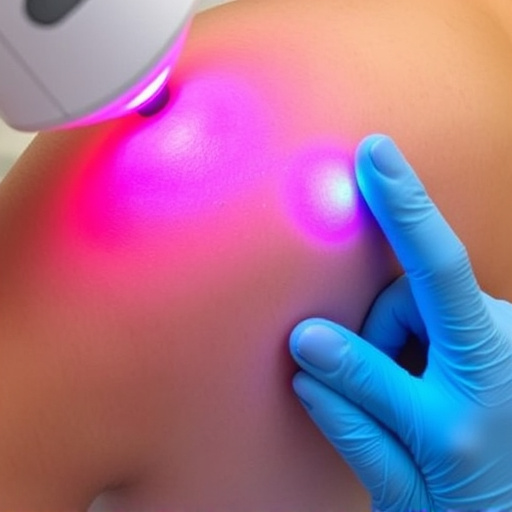Dermatitis, an inflammatory skin condition, requires proactive treatment to prevent severe damage like thickening, scarring, and increased infection risk. Effective management involves symptom relief, trigger understanding, hygiene practices, and soothing anti-inflammatory techniques. Severe cases may need medical interventions such as topical medications, light therapy, or microneedling for skin rejuvenation and collagen stimulation. Post-treatment, personalized skincare routines, regular consultations with dermatologists, and advanced treatments like chemical peels promote long-term skin health and prevent future dermatitis flare-ups.
Dermatitis, an inflammatory skin condition, can lead to significant skin damage if left unchecked. This article delves into understanding the various types of dermatitis and the associated risks of further skin harm. We explore effective dermatitis treatment strategies aimed at soothing symptoms and preventing long-term complications. From topical remedies to lifestyle adjustments, these approaches safeguard your skin’s health. Additionally, we discuss post-treatment care and management tips for maintaining optimal skin condition and minimizing recurrence risks. Discover how the right dermatitis treatment can transform your skin’s future.
- Understanding Dermatitis: Causes and Types of Skin Damage at Risk
- Effective Dermatitis Treatment Strategies to Prevent Further Harm
- Long-term Care and Management for Optimal Skin Health After Treatment
Understanding Dermatitis: Causes and Types of Skin Damage at Risk

Dermatitis, an inflammatory skin condition, can lead to various types of skin damage if left untreated or improperly managed. It’s essential to understand that dermatitis isn’t just a single entity but comes in several forms, each with its unique triggers and manifestations. Atopic dermatitis, for instance, is often chronic and linked to allergies, while contact dermatitis results from direct exposure to irritants or allergens.
When dermatitis goes untreated, it can cause skin thickening, blisters, itching, cracking, and even scarring. In severe cases, it may lead to permanent skin damage and increase the risk of infection. Effective dermatitis treatment is crucial not just for soothing symptoms but also for preventing further complications. Medical spa services, such as chemical peels and anti-aging treatments, can be beneficial in managing severe cases by exfoliating damaged skin layers and promoting healthier, more resilient skin.
Effective Dermatitis Treatment Strategies to Prevent Further Harm

Dermatitis treatment goes beyond addressing existing symptoms; it’s a proactive approach to safeguard your skin from further damage. A comprehensive strategy involves understanding and managing triggers, maintaining excellent skin care hygiene, and adopting soothing, anti-inflammatory practices like applying emollients and avoiding irritants.
For more advanced cases or persistent conditions, medical interventions offer powerful solutions. Topical medications, light therapy, and even procedures like microneedling therapy can be employed to promote skin rejuvenation and wrinkle reduction. These methods work to repair damaged skin barriers, reduce inflammation, and stimulate collagen production, ultimately mitigating the risks of long-term skin damage associated with dermatitis.
Long-term Care and Management for Optimal Skin Health After Treatment

After successful dermatitis treatment, maintaining optimal skin health requires long-term care and management strategies tailored to individual needs. Personalized skincare routines become essential, focusing on gentle yet effective products that soothe and protect the skin barrier. Regularly consulting with dermatologists or specialized skincare professionals ensures these routines are adapted as skin conditions evolve.
Additionally, treatments like chemical peels and microneedling therapy can be integrated into a comprehensive skincare regimen to boost collagen production, improve skin texture, and enhance the skin’s natural defenses against future dermatitis flare-ups. These advanced procedures, when combined with consistent self-care practices, offer a holistic approach to managing dermatitis, promoting long-term skin health and minimizing the risk of further damage.
In conclusion, understanding dermatitis and its potential to cause skin damage is the first step towards effective protection. By employing strategic dermatitis treatment methods, individuals can not only mitigate current symptoms but also significantly reduce the risk of further harm. Long-term care and management are essential for maintaining optimal skin health post-treatment, ensuring a lasting positive impact on one’s complexion. Remember, timely intervention through appropriate dermatitis treatment is key to preserving skin integrity and vitality.














